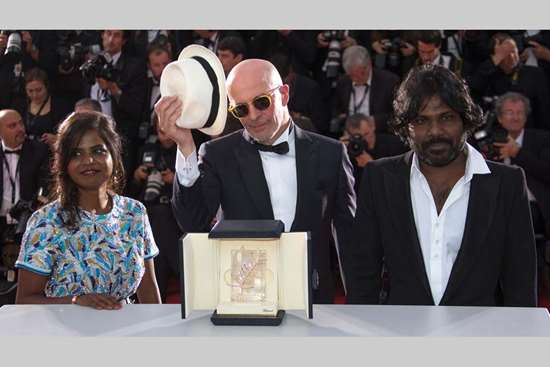
Triumph: Jacques Audiard with his lead actors and the Palme d’Or at Cannes REUTERS (FROM OUTLOOK 15 JUNE 2015)
Despite the rather improbable and violent end, Audiard imbues his film with tenderness and lyricism. He said the film was inspired by immigrants who try to make a living selling roses to diners in restaurants. “These people are treated with indifference, contempt and rejection. I wanted to know what lay behind their lives,” Audiard said.
|
The true-life story of Anthonythasan Jesuthasan provided much of the detail. The novelist-turned-actor said he looked at French society through many eyes: as a person of colour, as a refugee, as a Marxist and as a novelist. “I have lived through many of the situations in the film. The crime-ridden ghettoes outside Paris are familiar to me. I still live there,” he said. Writing in The Independent, Kaleem Aftab said: “Dheepan is a radical and astonishing film that…takes a faceless immigrant coming from a war barely covered in the media and turns him into a Travis Bickle-type anti-hero.”In Little Sri Lanka in Paris’s 10th district, entirely inhabited by Sri Lankan Tamils, many of them civil war veterans, shoppers mill around buying mangoes, bhindi, Haldiram’s namkeens or Indian film and music DVDs. Sudersan, who works at a music store and claims to have known Anthonythasan, says it’s a proud moment for the community. “We know him well here and are waiting to see the film….” Does it bother the Tamil community that the protagonists are shown coming to France on passports taken from the dead, using fake identities? “No, it’s the truth. When your family has been killed, when you are fleeing for your life what other option do you have?”
Although many critics considered it to be an unlikely winner, Dheepan was hailed by the jury, who said it had taken them very little time to decide. “Swift”, was how Ethan Coen, who jointly chaired this year’s jury with his brother Joel, described the decision.
That said, it is unlikely the film will be a great box office draw. “There is increasing immigrant-fatigue. The French are fearful of their economic future and afraid of the increasing number of immigrants pushing into Europe. Empathy, especially now, with the arrival of the Front National and other extremist parties, is drying up. Will the French really want to see a film where most of the dialogue is in Tamil?” asked cinema critic and journalist Natalie Attasi.